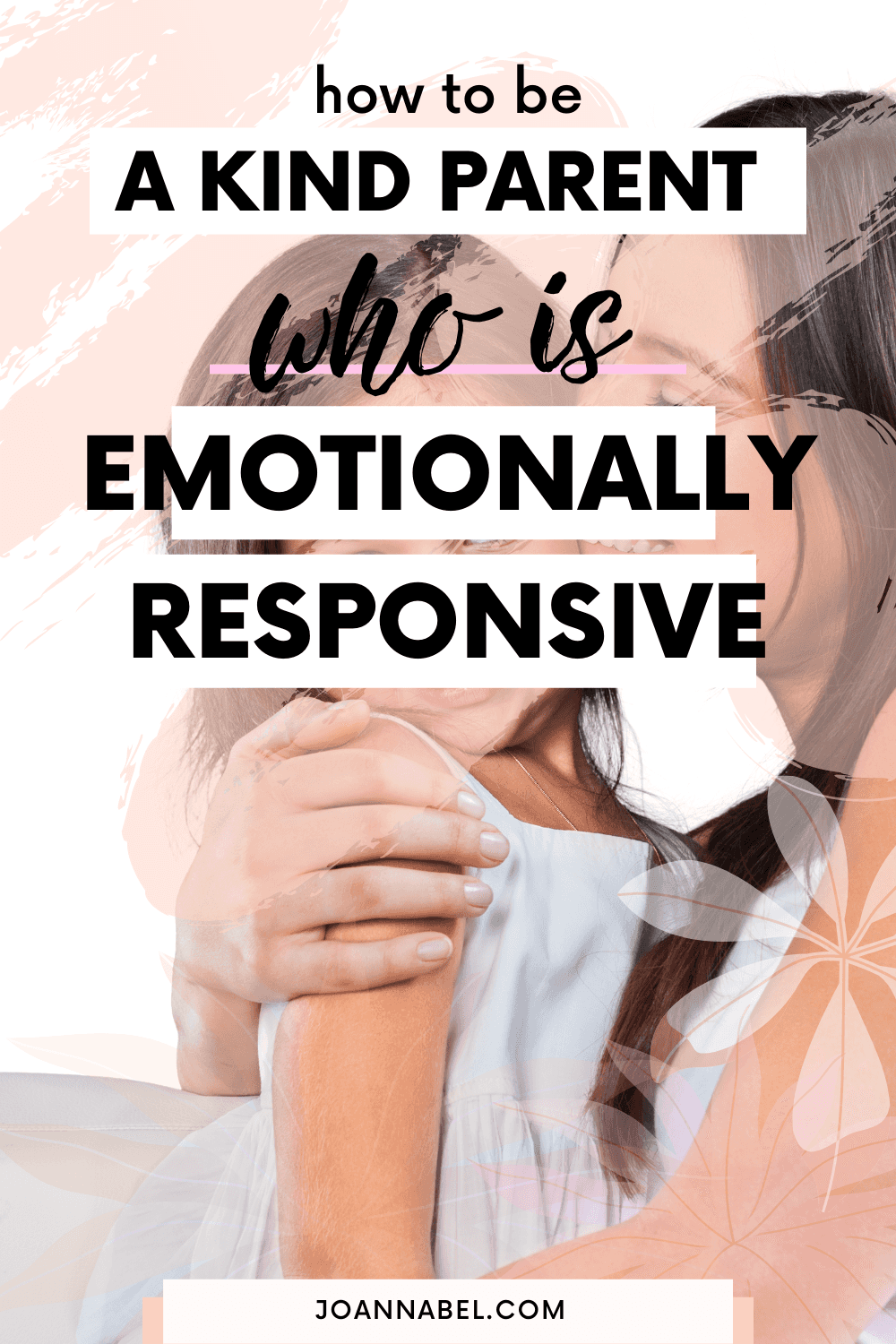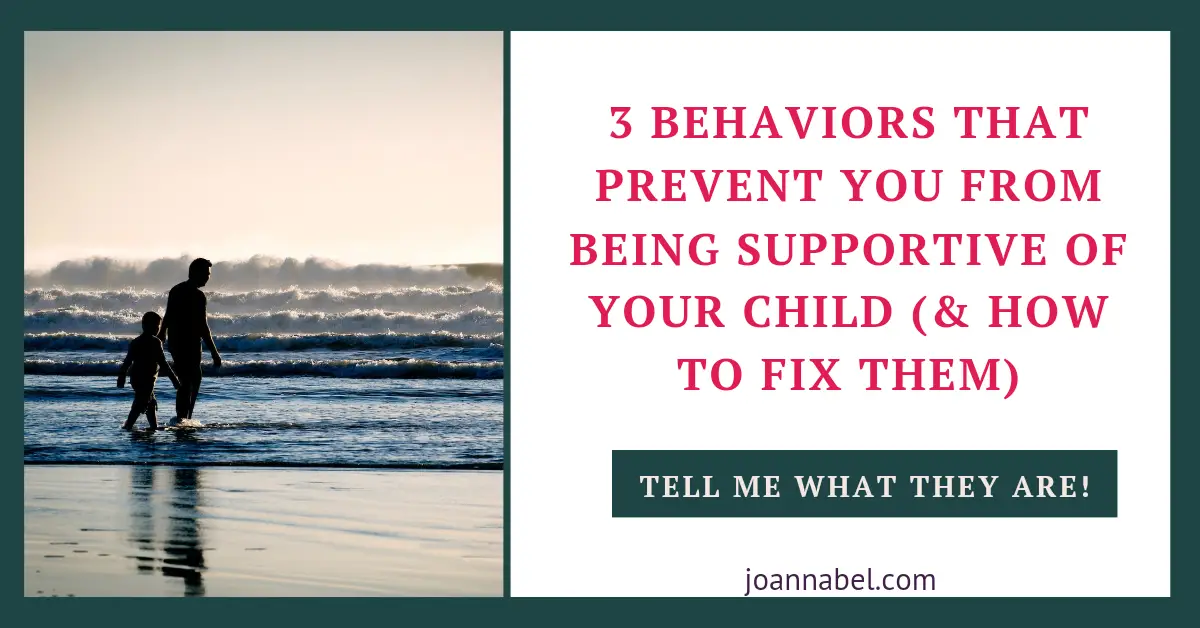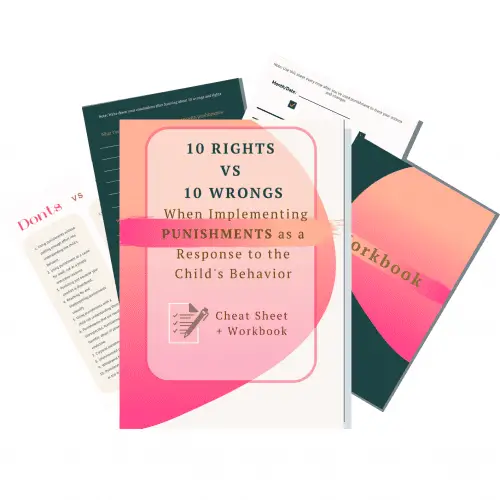Are you one of those who are not sure what responsive parenting is and if your parenting is responsive parenting? Maybe someone questioned it recently. Or you’re afraid your experience with your parents has affected your capability to live up to responsive parenting. Or on the other hand, you’re one of those who believe they are 100% emotionally responsive parents but still want to check out what we pointed out here.

What Responsive Parenting Is
Whatever it is, you’ve definitely hit the right page if you want to know more about responsive parenting or be sure you’re one of these parents.
Responsive parenting means being attentive to the child’s emotional and other needs by developing a sensitive and sensible (perceptive) reception to what the child requires and providing a response suitable for the child’s developmental phase.
This suggests that to be able to respond optimally, you need to show empathy – be receptive to the child’s emotions, and decenter – understand their point of view (separately from your point of view). Additionally you need to be able to recognize if the response is suitable for the child’s developmental phase.
When you become a responsive parent you:
- acknowledge a child’s unique position (concerning positions of power, dependence, developmental stage, etc),
- you show interest in the child’s perception (point of view) and their emotions (you show you care)
- and you’re respecting their perception and their emotions.
So, in this post, we’ll be covering what responsive parenting really is. Then we’ll talk about the ways you can show your children you love them by following certain logical guidelines. In the last part, you’ll see how to detect your level of responsiveness, by pointing out the positives and the issues (things to avoid/change) through 4-type indicators. And as a BONUS, you’ll find an actionable tip for you to follow (after you’ve recognized how emotionally responsive you are as a parent in case you need to change something).
So at the end of it, you can be sure your kid will be raised on positive foundations, so you can be proud of yourself and them. Let’s dive in!
Note: Although I am a Clinical Social Worker, engaging with this website does not establish a professional social worker-client relationship. The information provided here is for general purposes only and should not be considered professional advice. While we strive to ensure accuracy and reliability, this content is not a substitute for professional guidance. For specific concerns, issues, or situations, it is essential to consult a qualified professional and present your situation. Read the full Disclaimer here.
A SMALL ENCOURAGEMENT BEFORE YOU UNCOVER IF YOU’RE A RESPONSIVE PARENT
Now, both positives and issues aren’t set in stone, which means they’re prone to change. Considering we’re affected by our heritage, social environment, by our good and bad experiences, as well as the constant process of learning. So don’t overthink or worry too much because you don’t always have everything under control. Just remember that things can change and you can manage that change.
You should always keep this in mind for 2 simple reasons:
- If you’re experiencing issues and difficulties with something, you can always learn new ways to do things and unlearn what you’ve recognized is no longer serving you.
- Family life can have periods of crises, where you might be struggling to preserve stability because the crisis is affecting your parenting.
What can always help in both situations, is relying on our personal strengths. Which makes them super important for recognizing, identifying, and using! In periods of crisis, they can keep you safe, while when you need to make a change they’re the ones who can support the process of going through change. More information on strengths should be left to one of the next blog posts, and we should focus on our topic of responsive parenting now. So let’s dive in!
WHAT IS MEANT BY RESPONSIVE PARENTING?
As we said – what is meant by responsive parenting is that a parent is attentive to the child’s needs by developing a sensitive and sensible (perceptive) reception to what the child requires and providing a response suitable for the child’s developmental phase. In simpler words – when there is emotionally warm and responsive parenting, then children are certain they’re loved, cherished, and respected enough as persons, as human beings.
The dimension called ”emotional warmth and responsiveness” is one of the several parenting capacity dimensions. Then this in combination with the right amount of positive discipline and adequate guidance and structure from a parent leads to more stability, confidence, stronger identity, solid integrity, more functional relationships, personal and social responsibility in children, and more!
If you’re curious about the other dimensions, I have a blog post that covers them, after finishing with this parenting capacity dimension. Just follow this link.

Emotionally warm and responsive parenting is sometimes confused with responsible parenting. And even though these two are close-knit, they’re not the same. Except for the obvious similarity of the words, this can also happen because, usually, the parents that fit (emotionally warm and) responsive parenting, are also meeting the ”criteria” for responsible parenting.
For example, considering they show empathy so they ”re able to recognize the child’s emotions and needs, they provide basic care, they’re stimulating the kids, keep them safe, etc. BUT, what happens if a parent is overly protective so they cater to any possible child’s need at any given time and place?
What do you think about this? Is this parent showing emotional responsiveness? Let me know how you see it in the comments. Now, let’s explore it a bit more.
UNDERSTANDING RESPONSIVE PARENTING THROUGH TWO EXAMPLES
First of all, with excessive protection over time a kid starts to feel smothered by this parent’s over-protective care because with growing up, the need for independence and autonomy grows too. And this doesn’t go hand in hand with overly protective parenting. So all of us as parents need to step back gradually.
And the need for protecting a child is, of course, totally natural and logical. It can be hard for parents to withdraw, because of the sense of purpose the care gives. So what I can say to you is to be brave. You’ll thank yourself in 10 years when your children are competent to do anything in life by themselves!
It’s just that, any parent needs to learn that when a child’s developmental phase is seeking independence, the parent’s urge for protecting the child (or a parent’s fear) needs to come second. It shouldn’t disappear.

So we put this child’s need first while being there for the child. That’s protection as well, that’s care and that’s love too. It’s just modified because the child’s needs are changing. But if we don’t do this on time or at all, our parenting can start distancing itself from responsive parenting. This is the case because:
- a child doesn’t feel so good emotionally anymore,
- this way a process of a child evolving into an autonomous person is jeopardized.
Here at the same time, we might still be considered responsible as parents even if we’re lacking skills to be responsive, especially if we decide to do something to change this.
And this is just one example, just to put these 2 terms into perspective (responsible parenting vs. responsive parenting) and why they should be separated. Considering you can often see them wrapped in one phenomenon. Emotional Warmth and responsiveness is a dimension of parental capacity. While being a responsible parent is broader and it has to do with more of these dimensions.
We can have warm parents who can empathize with the child’s emotions, but at the same time not fit some important criteria for fully responsible parenting.
Just think about a permissive parenting style, where the parent is very warm but doesn’t confront a child, doesn’t set proper boundaries, lacks disciplinary measures, is too easy on the child so the child’s manipulating the rules, and so on.
This way emotional responsiveness turns from a positive into an issue at one point.
In case you want to learn more about parenting styles check out my blog post Parenting Styles: All You Wanted to Know. Or if you’re curious whether your parenting style is permissive, read the post on the permissive parenting style.
RESPONSIVE PARENTING AS A CONTROVERSY
This parenting capacity dimension can be misunderstood sometimes. Or its importance is underestimated. And in the recent past, it was seen from a stereotypical perspective, where it was pointed out that a mother, has an ”emotional” role, while a father has an ”instrumental” role (we won’t focus on explaining this term at this moment, because of the focus of this blog post).
Thankfully, the family’s going through change nowadays, so the roles are not divided in this way, and things are more flexible.
As in many other things, a women’s work was often presented and positioned as less important (this is usually implied, not always said openly), and so was this. While at the same time vulnerability wasn’t or isn’t very welcome in men. And emotions have been of course wrongly associated with being weak. I’d say they’re being associated nowadays too. When the truth is we all have emotions and we all need to have them.
So from this perspective, emotionally responsive parenting can be even called controversial. Especially if you remember how more sensitive men were usually (or are often) called. Maybe you’d say that’s a strong word, but you get the picture. Therefore it’s important to understand it properly. But that’s not the main reason, of course! The main reason is its importance forraising a healthy and well-adjusted human.

Just think about most people you know that are denying the need for getting in touch with our emotions or emotionally connecting with others. Would our first association of them be that they’re cheerful, fulfilled, and positive? Probably not.
Now what’s important here is not to oversimplify and understand it just as being emotional or warm. As we pointed out in an example of a permissive parent or an over-protecting one – what’s important is the right balance between dependence and independence, protection and releasing, permissiveness and demandingness.
Also, this isn’t just related to kids’ parents. Kids need stable and safe relationships with all the other important adults surrounding them. Children need them to be emotionally responsive and warm enough as well. Their grandparents for example.
You may want to read also:
- 100 Ways To Be Kind To Your Child
- 100 Ways To Show Your Children You Love Them Deeply
- What Is The Rejecting Parenting Style And Are You A Rejecting Parent?
- What Is The Permissive (Laissez Faire) Parenting Style And Its Characteristics And Effects?
- What Is Authoritarian Parenting Style And Who Are Authoritarian Parents?
- Should You Give Your Children Gifts To Apologize?
WHY IS RESPONSIVE PARENTING IMPORTANT?
Responsive parenting is important because being emotionally warm and responsive targets the child’s need for safe, stable, and persistent connections and relationships with the close and significant adults in their lives when those adults are responsive and sensible to the child’s emotional needs.
Such as the need:
- for closeness and emotional warmth
- for connection
- to be seen, acknowledged as worthy, and treated as worthy
- for appreciation and visibility
- to be empowered and encouraged
- to be heard and understood
- to be reassured and comforted
- for having dependable, trustworthy, and reliable adults in their direct social environment
- to feel loved
- to be certain they have a responsible and competent parent
- to be guided and praised
- to feel respected, and worthy in situations when their identity intersects with age and maturity, race, religion, sexuality, disability, etc.
- physical touch they’re comfortable with.
If you want to go into more detail concerning the importance of responsive parenting for a healthier child upbringing and development, read my post Why Is Responsive Parenting Important For Raising Emotionally Healthy Children?.
HOW CAN PARENTS BE RESPONSIVE TOWARD THEIR CHILDREN?
As I mentioned, responsive parenting creates an environment where children feel valued, cherished, and secure. While perfect parenting isn’t realistic, striving for “good-enough responsiveness” can make all the difference. Here are some general guidelines on how to make this mindset a reality.
1. SHOW YOUR CHILD YOU CARE
Children, like all of us, need to feel appreciated, loved, and respected. It’s easy to overlook these simple truths in the hustle of daily life. Here are key ways to express care:
- Openly express your emotions and encourage them to do the same.
- Communicate appropriately, considering their age and maturity.
- Offer physical affection in ways they’re comfortable with.
- Make them feel safe without being overprotective.
- Guide them toward independence as they grow.
- Trust them and help them feel respected and valued.
- Model responsibility and encourage open conversations.
It’s often the small, intentional acts that mean the most. For more tips, check out my post on 50 Ways to Show Your Child You Care.
2. KEEP YOUR COMPOSURE IN MANAGING MISTAKES
How you respond to your child’s mistakes teaches them invaluable lessons about handling challenges. Avoid the extremes of harshness or permissiveness. Instead:
- Don’t take their mistakes personally.
- Correct their actions gently and constructively.
- Ensure they understand why they’re being disciplined and that it doesn’t affect your love for them.
- Keep consequences fair and proportionate to their actions.
- Avoid intimidating or yelling. Instead, explain the impact of their behavior.
- Celebrate their successes and motivate them to improve.
Balanced discipline fosters growth, not fear, and strengthens your bond.
Related:
3. BE TRANSPARENT
Honesty builds trust, but it’s essential to communicate at an age-appropriate level. When faced with family issues or significant changes:
- Share the truth in ways they can understand.
- Avoid hiding problems that impact them directly.
- Reassure them when they sense something is wrong.
- Ask yourself if withholding information is truly for their benefit.
Open, honest conversations prevent confusion and anxiety, helping your child feel secure and connected.
4. ENCOURAGE FREEDOM, INCLUSIVENESS, AND PARTICIPATION
Give your child the freedom to explore and express themselves while fostering a sense of belonging. Here’s how:
- Teach them to navigate fears and challenges with care and confidence.
- Create a reliable and safe environment where they can thrive.
- Involve them in decision-making and family discussions as much as possible.
- Help them shape their identity while respecting differences in age, race, religion, sexuality, or abilities.
Kids crave the opportunity to share their thoughts and be heard. It validates their worth and prepares them to navigate a complex world.
I’ve created a separate post for you on how to be a responsive parent with more detailed guidelines for each of these 4 practices I suggest you follow. Check it our here: How To Be A Responsive Parent (Nurture Your Child’s Confidence And Emotional Stability).
A QUICK REMINDER ABOUT RESPONSIVE PARENTING
Being responsive as a parent doesn’t mean you’ll be able or that you have to always excel at everything in every moment. And you’ll make mistakes and learn along the way as we all do. Additionally, it’s not possible to satisfy every child’s need at every moment, and it’s not even advisable. Parenting is situational.
What matters also is that you learn to differentiate a mistake from a behavioral pattern and then treat it the right way. And keep in mind that the way you look at this can be deceptive. This means:
- you could be exaggerating and overreacting about mistakes, and it could continue to torture you endlessly
- you could also have a habit to minimize the problem and see a pattern as a mistake because it’s hard for you to face it.
If you can’t be sure, ask for an honest opinion, but be prepared and open to really hearing the truth.
What’s important is the fact that if we slip now and then this won’t affect your child’s life quality too much or even at all. Or a child-parent relationship. Especially if you talk to them and explain things. Kids will know you are there for them, and that’s what matters the most.
SIGNS OF EMOTIONAL WARMTH AND RESPONSIVENESS
Speaking of patterns, now it’s time to put your (or some other parent’s) emotional warmth and responsive parenting in perspective. For this, you can use the next 4 pointers or indicators (adaptation based on Bentovim, et al, 2009).
In order not to burden the blog post and (your precious mind) with more information, I’ve pointed out only positives and issues to make it easier for you. Let’s see what are the signs of emotional warmth and responsiveness and what are some issues you need to deal with to become emotionally warm and responsive.
1. HOW MUCH CONSISTENCY YOU SHOW IN YOUR RESPONSIVENESS AS A RESULT OF RECOGNIZING THE CHILD’S EMOTIONS
Positives:
- Emotional warmth and balanced closeness
- You handle your emotions properly and you’re in balance
- You are tolerant enough
- You respond to the child´s emotion accordingly and the child can predict it
- You show your emotions and they are clear and understandable
- You show you understand or trying to understand
- You know how to reassure the child
- You know how to teach a child to handle emotions
Issues:
- You lack empathy or/and have an emotional deficiency in general
- You lack understanding of your child’s emotions
- You lack consistency in emotional responses to your child’s emotion or action
- You’re usually/always flooded with your emotions and all ”over the place”
- Your tolerance threshold for frustration is too low
- You aren’t able to teach a child to handle his emotions
- You’re not showing and sharing your emotions at all
- You’re refusing your child emotionally and physically most of the time
- You’re cold and distant
- You’re a constant critic
- You’re over punishing
- You’re humiliating your child
- You’re manipulating your child´s emotions
- You’re physically and psychologically violent to the other parent (the child is also the victim of this violence)
- You’re abusive of the child
- You are alienating your child from its other parent or significant relative or person, etc.
2. HOW YOU EVALUATE AND THEN RESPOND TO THE CHILD’S EMOTIONAL TONE
Positives:
- You’re usually assertive in responding
- You’re showing you are respectful of the child
- You’re supporting the child
- You’re accepting the child and showing him how to accept herself/himself
- You’re caring
- You’re reassuring
- You’re empowering and strengthening the child
Issues:
- You’re not assertive enough
- You are too passive and demure
- You ignore the child
- You avoid the child
- You reject the child
- You humiliate the child
- You’re patronizing
- You are offensive
- You are attacking
- You are hostile

3. WHAT KIND OF TONE YOU’RE USING WHEN YOU COMMUNICATE WITH THE CHILD IN GENERAL, AND WHAT ATMOSPHERE YOU’RE CULTIVATING
Positives:
- Your tone is balanced and positive
- You manage to remain calm and put together enough
- The atmosphere mostly feels certain, friendly, positive, warm, and calm
- You keep your composure
Issues:
- Your tone is negative majority of the time so are your emotions
- Your tone is panicking and alarming
- Your tone is aggressive and hostile
- The atmosphere, in general, is unpleasant
- The atmosphere is hostile
- The atmosphere is too chaotic and stressful
- The atmosphere is too uncertain
- The atmosphere is fearful and scary
4. HOW SUPPORTIVE AND ENGAGED YOU ARE WHILE MANAGING TO ADDRESS THE TENSION BETWEEN INDEPENDENCE AND DEPENDENCE IN PROVIDING THAT
Positives:
- You stand by your child and show interest
- You´re devoted to your child
- Your expectations of your child are reasonable and properly balanced (hugh but not too high, and not too low)
- You respect your child as a person
- You show up and show support
- You are respecting your child´s boundaries and the need for balanced privacy/separation
- You supervise the child properly
- You properly understand the constant tension between independence and dependence
- You don´t run over the balance between the need for dependence and independence
Issues:
- You’re ignoring the child and you’re not included
- You’re not supportive of the child
- You’re exploitative of the child
- You’re putting the child down
- You’re humiliating and offensive
- You’re intrusive
- You’re over interfering
- You’re over caring, over protecting mixed with pressuring
- You’re fearful of confrontation with the child
- You’re verbally and/or physically attacking the child
- You’re too dependent on your child
- You’re making the child too dependent
- You’re forcing the child to be too independent
- The child’s and parent’s roles intertwine and crisscross
- The child switched the role with the parent

Again, just remember we’re talking about what happens on average, what’s the usual, and what’s happening most of the time, we’re not trying to be robots of course :).
Feel free to use these pointers to try to analyze where you stand. And keep an open mind. It’s the regularity in responsiveness that counts, not the exceptions. In many periods, especially if we’re going through a certain personal or family crisis, it’s common and usual that our parenting gets affected by it.
Just keep going.
WHAT YOU CAN DO WITH YOUR FINDINGS TO BECOME MORE RESPONSIVE AS A PARENT
Firstly, you need to congratulate yourself you’ve come this far because this way you’re already moving towards change and dealing with all of this. Well done!
Secondly, you should take notes of your most important conclusions so you won’t forget them. And of course, now that you have these 4 pointers, you can continue to be mindful of it all. And follow your progress, too.
Also, write down HOW YOU FEEL about the things you’ve learned about yourself and your situation. But don’t forget to write down how you feel about all THE OTHERS included in this situation, as well. This will help you integrate the cognitive and emotional parts of your findings. This is crucial in moving past where you are now. Also, it’ll help in resolving any conflicts with others connected to the issue you’ve spotted.
After you’ve done that go through the next questions:
What brought the issue?
How can you contribute to change?
What do you need to make a change?
What is your level of motivation to make a change now?
Is this a good time? Can you make it a priority at this moment?
Are there other aspects of your parenting that need your attention more at the moment?
Or is this aspect of parenting going to be positively (or negatively) affected after something else gets finished (that you’re going through right now)?
What’s the first step you should take?
And so on and so forth. Keep asking yourself the important questions. Block some time to answer these questions, and more that’ll come to mind and are related to your specific situation and will help to make a change. Try with 15 minutes. Just 15 minutes in your day or your week, that’s not too much either way.
Latest Posts:
- 5 Hobbies That Will Help You Connect With Your Teens
- A Guide to Balancing Parenting Roles After Divorce
- Gifts for Your Teenager That They’ll Actually Enjoy
- 6 Reasons Your Teenagers Seem Distant and Distracted
- Special Gifts to Let Someone Know You’re Thinking of Them (13)
- 100 Ways to Challenge Yourself (Without Stretching Yourself Too Thin)
FINAL THOUGHTS ON WHAT RESPONSIVE PARENTING IS
I hope this post exploring what responsive parenting is was helpful and useful to you, and that you can utilize it to your advantage and for your best interest. But also in the best interest of your children.
Remember, you’re doing your very best at this moment so shout out to you! Well done for everything you’ve been through, you’ve learned and accomplished. Just keep going. And keep in mind there’s always more place to learn, improve, and become the version of a parent you want to be. Continue here:

















Thank you for this useful insight. It was a great opportunity to check how responsive my parenting is. I look forward to reading more posts related to this important topic!
Hi, Bo, thanks for sharing your feedback! There will be more posts related to responsiveness, considering this affects parenting profoundly and contributes to its effectiveness. 🙂